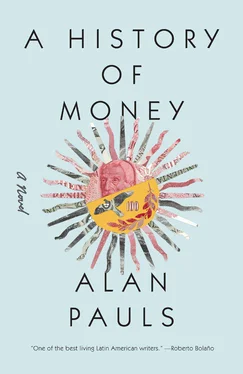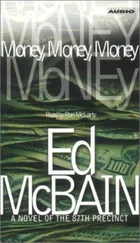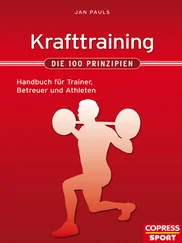Alan Pauls - A History of Money
Здесь есть возможность читать онлайн «Alan Pauls - A History of Money» весь текст электронной книги совершенно бесплатно (целиком полную версию без сокращений). В некоторых случаях можно слушать аудио, скачать через торрент в формате fb2 и присутствует краткое содержание. Год выпуска: 2015, Издательство: Melville House, Жанр: Современная проза, на английском языке. Описание произведения, (предисловие) а так же отзывы посетителей доступны на портале библиотеки ЛибКат.
- Название:A History of Money
- Автор:
- Издательство:Melville House
- Жанр:
- Год:2015
- ISBN:нет данных
- Рейтинг книги:3 / 5. Голосов: 1
-
Избранное:Добавить в избранное
- Отзывы:
-
Ваша оценка:
- 60
- 1
- 2
- 3
- 4
- 5
A History of Money: краткое содержание, описание и аннотация
Предлагаем к чтению аннотацию, описание, краткое содержание или предисловие (зависит от того, что написал сам автор книги «A History of Money»). Если вы не нашли необходимую информацию о книге — напишите в комментариях, мы постараемся отыскать её.
and Sam Lipsyte’s
in its subtle, brilliant depiction of the place of money in its protagonists’ lives.
It begins with a body: a top executive of an iron and steel company dies after his helicopter, traveling toward the factory where he is due to meet with striking workers, plummets into the river. The briefcase full of money which he was carrying disappears without a trace. Accident, or assassination? And where is the money?
A History of Money And his individual story is echoed in the larger story of Argentina in the 1970s and ’80s, where money is everything: promise and punishment, dream and disaster. An intensely evocative novel from one of the world’s most exciting new writers.
A History of Money — читать онлайн бесплатно полную книгу (весь текст) целиком
Ниже представлен текст книги, разбитый по страницам. Система сохранения места последней прочитанной страницы, позволяет с удобством читать онлайн бесплатно книгу «A History of Money», без необходимости каждый раз заново искать на чём Вы остановились. Поставьте закладку, и сможете в любой момент перейти на страницу, на которой закончили чтение.
Интервал:
Закладка:
He’d like to thank him, at least. He seeks him out in the next few days, asks him to lunch, to see a film, to meet him for a drink. He could swear that his father is avoiding him. The few times he does see him, always at the office, the only place he can be sure of ambushing him, and always hurriedly, because every single time, his father has to get to a meeting or has people waiting for him, he takes advantage of the few minutes he has and talks. At the mere mention of the money, his father busies himself with something else — a phone ringing in a nearby office; the mess of bar napkins covered in scrawling, coffee receipts with notes on the back, and phone numbers written on bits of ripped newspaper that he calls my diary —or frowns and even seems to get annoyed, like those very modest or very vain people who love recognition when it takes them by surprise, but who get prickly about praise for talents they already know they have.
He’ll have to wait years to find out the truth behind his father’s behavior: until his father is in the last stage of life — last in the strictest sense, meaning the stage of hospitalization, because as soon as he’s admitted to the hospital and he sees the retinue of doctors and nurses crowding around him — him, the man who’s set foot in a medical practice only twice in seventy-two years, and both times for the most extraneous reasons, to collect payment for some tickets to Cancún the first time and a poker debt the second — he knows there’s no going back, that he’ll only be exiting this stage feetfirst. Though it’s true that the explanation comes from his father, out of his mouth, one night when it’s his turn to sit beside the bed, it’s not exactly his father who confesses. It’s not the same man who comes to the hospital of his own accord a week earlier, in any case. That man is very tired and bathed in sweat. His thighs are cramping up with a pain like nothing he’s ever felt before, and his blood pressure’s through the roof, but he’s also sufficiently with it to stop the taxi without interrupting the sermon on soccer and politics with which he’s been persecuting the driver, a combination he excels in and to which his blood pressure is particularly sensitive. His reaction to the dizziness that overcomes him in the street — the latest in a series of episodes he’s been keeping secret — proves that he’s still in his right mind: he goes straight to the hospital — an absolutely astonishing decision for him, given the disdain he’s always so famously professed for the medical world, and the equally famous good health, or pride, that has enabled him to manage without his son — and after arriving and being confined to a wheelchair that he initially rejects but is soon thrilled by, like a bad-tempered child who’s figured out how to turn some stupid adult treasure against its owners, he objects to every method by which the doctors propose to stabilize him, treating them as though they’re completely useless, fleeing them in his chair, and launching himself at full speed down the ramps in the emergency room. Between the wild, irascible man who checks in to that citadel of medicine of his own will and drives its residents crazy, and the glassy-eyed ghost who suddenly starts remembering everything aloud in the intensive care unit where he spends almost two weeks (how he was never sure whether he’d be able to get the money back; how many times during those ten days he nearly called him to confess that he had lost it all; how many he felt he couldn’t face it and considered disappearing off the face of the earth), there come an angioplasty to which he submits with contagious and belligerent good cheer, the disastrous coronary symptoms that flare up as a result of the angioplasty, and almost five hours of open-heart surgery, five hours of brutal butchery from which it’s not clear to anybody how he will recover, if he’s lucky enough to, and from which he does ultimately recover a minimal kind of life, stuffed full of tubes and with his chest slit from throat to diaphragm and wrapped in a corset made of bandages that are soon soaked with blood.
He’s the one keeping his father company on the night three or four days after the operation when a nurse announces with a smile that stretches from ear to ear that they’ve taken the ventilator away to see if he can manage on his own. He came to the hospital just to come, because there’s nothing else he can do, not because he thought it would be useful. He’s only allowed in the room intermittently, for half an hour out of every two. He spends the rest of the time in the waiting area, dozing and reading in its bad light, and is flooded with surprise and envy when he sees the camping kit — thermos, blankets, a little plastic cooler, board games, a nightstand — his neighbors unpack for their vigil, proving themselves to be either less shortsighted or more experienced than him in the matter of hospitalization. All he wants is to be in the room. As soon as a nurse reminds him of visiting hours and he leaves it for the dull light of the waiting area, he begins to yearn for the starry, throbbing darkness in which his father lies sleeping, as though it were some strange kind of paradise, a chilly, modern kingdom full of mechanical emotion and electronic diversions. Then an hour and a half later, when they let him in again, he feels nothing but desolation: sadness; helplessness; an awful, bloodsucking boredom. There’s nothing he can do. He’d like to touch his father, but he doesn’t know where; it’s impossible to reach his body through all the tubes, catheters, and wires. And he might not touch him even if he did know. He’s terrified that any gesture, let alone a loving one, could irreversibly alter the extremely delicate equilibrium that’s keeping him alive. There aren’t even any chairs in intensive care — they’ve thought of everything that might keep visitors away — so he dozes standing up, clutching the book he won’t read because there isn’t enough light.
At one point he thinks he hears a noise coming from his father, the tail end of a human phrase, and opens his eyes. Just as it occurs to him that he might have heard it in his sleep, coming from one of the spruce, smiling gravediggers he’s been talking to lately in his dreams, he sees his father half open his mouth and move his head on the pillow; it’s a slow movement, the sort you’d expect from a body that has forgotten its own existence, but perceptible nonetheless. He draws near and leans toward him. Bad breath, drugs, sweat, disinfectant: it’s an effort to withstand the smell emanating from his body. He sees him struggle to swallow and soaks a patch of gauze in the glass of water next to the bed, then wets his lips. His father takes a deep breath that seems almost like a show of irritation and then sinks back into blackness. He has never seen him so pale. The skin on his face looks so thin you could tear it with a fingernail. A bruise has stained one side of his neck purple like a secret kiss. He moves a little farther away, just far enough to see his whole face, and when he’s regained his focus he jumps another two steps backward, stunned. His father has opened his eyes and is looking at him. For a moment he doesn’t know what to think. Has he come to? Is he dying? Then he seems to take up that lost sentence again, and the dark, moldy tongue he spoke it in; he lets out a long, dragging sound, a sort of voiced sigh that weaves through the air and then abruptly turns into a word halfway through, as though impelled by some sudden necessity, which then becomes two clear words that come together, and he speaks.
He seems to be worrying about something imminent, a danger so close and apparently so serious that it’s managed to do what drugs and visitors couldn’t: repatriate him after a ninety-six-hour coma, a limbo that he later — sometime during the brief interval in which his father seems to convince everybody, including the doctors, that he’ll pull through — remembers with great joy, the same way many of his father’s Jewish clients remember the stay at the Király thermal baths that he inserts into their itineraries without telling them, like a secret courtesy. He’s very agitated. He lifts a hand and points to one side with his index finger, signaling a vague area between the terry-cloth slippers he still refuses to use and a three-legged IV stand. He asks, demands to be given his pants. He demands just like that, in general, not aiming the request at him, his son, who never has been nor ever will be as thankful for anything as for the gift of hearing his voice again after the four days he’s been in a coma; it’s not aimed at him, though he’s fixed his gaze on him and is now separated from him by less than twenty centimeters, but at nobody, or maybe at the same unknown, hazy interlocutor he was speaking to a few minutes earlier, while he was asleep. He needs his pants, the money in the pocket of his pants, right now. He has to tip the morning nurse before she leaves. Because if he waits, who knows what the others will do with the cash? It’s no use telling him that it’s two in the morning, that the morning nurse won’t be there for five hours, that there’s no rush. He isn’t listening. He tilts his head very slightly to one side with a cheerful distrust, like a dog whose master is attempting to speak its language, but nothing he hears seems to penetrate the stupor that’s shielding him. Now, he wants his pants now, before the shift ends and the nurse leaves. The only nurse who speaks German. There, in the pocket. He’s asking him this one favor: to get the cash from his pants pocket. His son changes tack. Maybe playing along will work better than contradicting him. How much does he want to give her? His father hesitates. He frowns, as though calculating, and while they waver, his eyes recover a little glimmer of humanity. Twenty thousand pesos? When he hears this, he laughs. The eight days his father has spent in the hospital probably cost the same amount. Twenty thousand? he repeats, you think so? His father looks at him again. I don’t know, he says, thirty thousand? The nurse speaks perfect German. She’s pretty, too, and she wears real shoes, not those flat pieces of junk nurses usually drag around. And she knows all the songs by heart: “Hans hat Hosen an,” “Laterne, Laterne,” “O Tannenbaum,” “Der Kuckuck und der Esel.” There, in my pants, he says, and points blindly again, and then he suddenly sticks an elbow into the bed and sits halfway up, sweeping the edges of the room with a keen, suspicious look. He leaps toward him to stop him, and while he’s there he pushes the button hanging from the bed. He’s so weak that his catheter and the wires connecting him to the heart monitor are enough to restrain him. He looks at himself for the first time, at his arms, and then his chest, and then he starts to follow the course of the tube emerging from his wrist but gives up after a few seconds, exhausted. All the evidence is there; none of it is powerful enough to prevail and break through to his consciousness. He sweeps the room again, looking confused. He can’t see his pants. He’s asking where his pants are. Blue corduroy; thick, blue corduroy. They were there, on the chair, before dinner arrived. Someone must have stolen them. He strokes his father’s face, smooths the wild clumps of hair that spring up when he lifts his head from the pillow. They must have taken them away to clean them, he tells him, and offers to leave the money for the nurse himself. His father looks at him in surprise, as though he’s not convinced but doesn’t think the idea is so absurd as to be ruled out immediately. He takes some cash out of his pocket and shows it to his father. Tell me how much and I’ll give it to her, he says. His father points to a few notes with his chin. Which, he asks him. The blue ones, says his father. How many, he says. Two, says his father: two blues. And then he seems to have second thoughts, and says, is that too much? His son smiles again.
Читать дальшеИнтервал:
Закладка:
Похожие книги на «A History of Money»
Представляем Вашему вниманию похожие книги на «A History of Money» списком для выбора. Мы отобрали схожую по названию и смыслу литературу в надежде предоставить читателям больше вариантов отыскать новые, интересные, ещё непрочитанные произведения.
Обсуждение, отзывы о книге «A History of Money» и просто собственные мнения читателей. Оставьте ваши комментарии, напишите, что Вы думаете о произведении, его смысле или главных героях. Укажите что конкретно понравилось, а что нет, и почему Вы так считаете.












